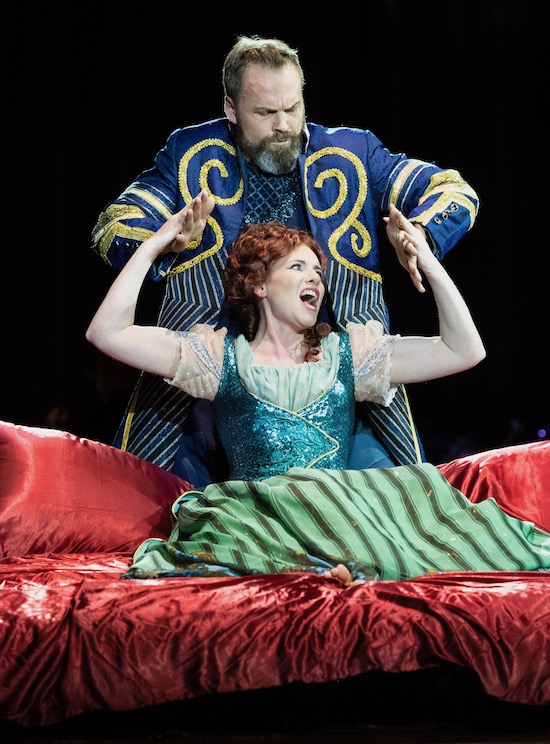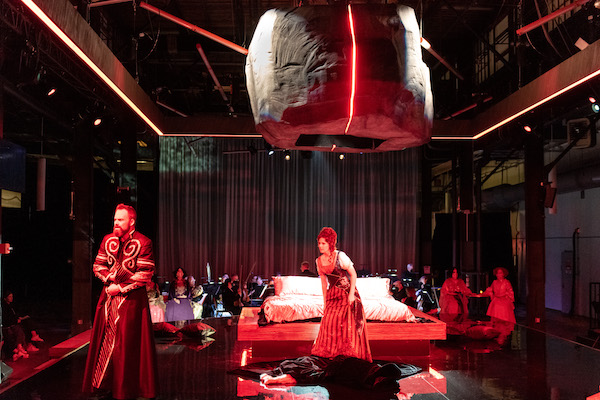Opposites attract with Boston Lyric Opera’s mashup of Bartók and Alma Mahler

Bluebeard (Ryan McKinny) tangles with Judith (Naomi Louisa O’Connell) in Bartók’s Bluebeard’s Castle at Boston Lyric Opera. Photo: Lisa Voll
In opera as in sports, sometimes a change of scenery is best. That’s been true for Boston Lyric Opera’s site-specific projects over the years, several of which have been among the company’s conspicuously successful undertakings.
Lightning struck again Friday night with a double bill of Béla Bartók’s Bluebeard’s Castle and Four Songs by Alma Mahler at, of all places, The Terminal @ Flynn Cruiseport in South Boston.
On the surface, this pairing is as unconventional as the venue. Bartók’s grim score inhabits a world of shadows and mystery. In it, the titular duke brings his new bride, Judith, to his home. She notes that seven doors in the castle are locked and asks for them to be opened.
Bluebeard warily agrees. They disclose, by turns, a series of harrowing and wonderful sights, though the final revelation–of Bluebeard’s three previous wives locked away for eternity–brings the story to a tragic denouement.
Bartók was just thirty at the opera’s premiere in 1911, but his music was already mature beyond his years. Often dense and dissonant, Bluebeard’s score also offers moments of radiant power and seething psychological tension.
Mahler, on the other hand, is better known for her assortment of famous husbands and lovers than for her music. Before her marriage to Gustav, though, she was an accomplished student of Alexander von Zemlinksy and the songs BLO offered on Friday (all from 1915) reveal a composer firmly at home in the world of fin de siecle chromaticism.
Intriguingly, the Bartók and Mahler works complemented each other well. The first three lieder—“Ansturm,” “Waldseligkeit,” and “Erntelied”—evoke emotional turbulence and the natural world. They were winningly sung by soprano Naomi Louisa O’Connell (accompanied by pianist Yukiko Oba in the first two and the BLO orchestra in the last) and provided a smooth segue into the night’s main event.
Some might lament that the last wasn’t a full-blooded, Hungarian Bluebeard: the opera is sung in English and what should be a massive orchestra is winnowed down to about thirty players. But yesterday, neither of those facts detracted from the performance.
Rather, music director David Angus ensured that the opera’s big instrumental moments, like the famous opening of the fifth door, packed a splendid punch (even if the latter lacked a foundation-rumbling organ entrance). And various softer episodes—the shimmery unveiling of the castle’s treasury, for instance, and the terrifying revelation of the Lake of Tears—teetered on a knife’s edge. Most importantly, the orchestra proved a deft accompanist to O’Connell and bass-baritone Ryan McKinney.
Singing the title role, McKinney cut a remarkably sympathetic Bluebeard. His instrument is rich-toned and resonant. Not once did he struggle to be heard or to lucidly enunciate the text. Yet his physical presence was equally compelling: this is a man of mystery, alright, but maybe those aren’t so threatening as they appear.
Leave it to O’Connell’s Judith to find out. Singing with appealing clarity and warmth, her character was insistent and determined—never shrill or hectoring—in her quest for answers. Indeed, O’Connell’s resilience was striking: Judith’s demand for the seventh door to be opened drew grunts and nods of approval from all around Friday’s sold-out house.
Across the evening, Anne Bogart’s staging made good use of the limited space. Sara Brown’s set basically consisted of a bed on a raised square stage with the audience on three sides and the orchestra on the fourth. Bluebeard’s former wives (though the score only notes three, there were six women filling out the parts; maybe some were mistresses?) sat at tables in each corner of the dais, where they periodically moved from table to table and engaged in brief moments of shadowy, slow-motion choreography.
The production’s symbolism (the opening of each new door results in a sheet being removed from the bed and Bluebeard losing an article of clothing) was a touch obvious: secrets being uncovered one by one. But the variety of colors, materials, and gestures employed–at one point, Bluebeard and Judith engaged in a short pillow fight, and the opening of the sixth door involved a huge, silver-gray blanket covering the whole stage–was welcome.
Trevor Bowen’s elegant dresses for the ladies seemed to locate the action around the 18th century, though Bluebeard’s azure robes suggested a certain timelessness. Meantime, Brian H. Scott’s crimson-heavy lighting design underlined the opera’s obsession with blood, while its moments of alabaster relief stood out.
So did Bogart’s final twist: at the end of the opera, Bluebeard, having shunted off his latest wife to the back room, curls up, despondent, at the foot of his bed. However, Judith isn’t done. She breaks into Mahler’s fourth song, “Licht in der Nacht,” which ends with the admonition (directed towards her husband) that he’ll never hear another voice after hers. The lights fade with all seven women surrounding a prostrate Bluebeard.
This is, on the one hand, a deeply ironic moment, especially coming from the pen of a woman who, in real life, collected men like Bluebeard amassed wives. At the same time, it might seem like a trite bit of late-in-the-game empowerment.
Yet the effect Friday was anything but. With Judith, Bluebeard seems truly haunted and reluctant. In Bogart’s hands, we see his fragile mental state finally collapse. Her concept makes for a strangely fitting conclusion to this weirdly ambiguous and still unsettling tale.
Boston Lyric Opera’s Bluebeard’s Castle and Four Songs repeats at 7:30 p.m. Saturday and 3 p.m. Sunday at The Terminal @ Flynn Cruiseport Boston. blo.org
Posted in Performances





